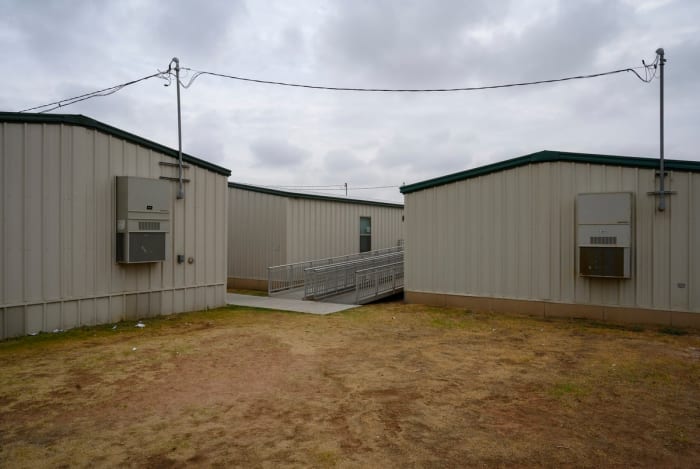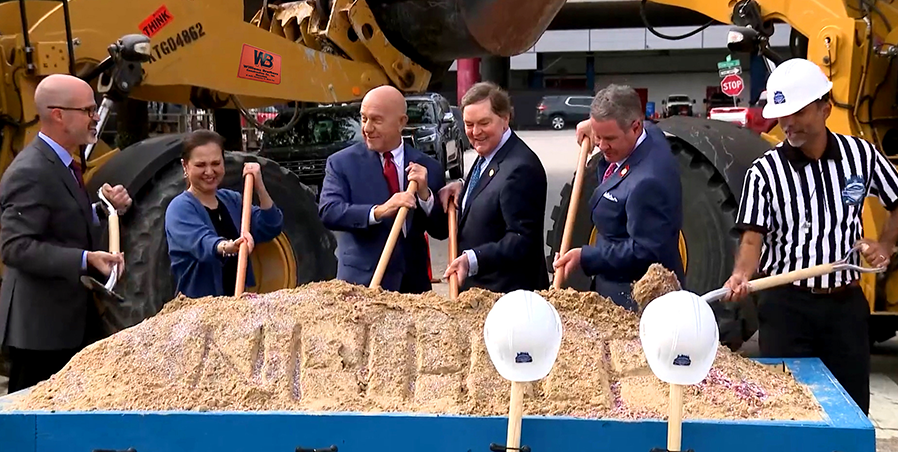Texas
With 22 portable classrooms on one campus, a growing Texas school district is asking voters for $2 billion

Subscribe to The Y’all — a weekly dispatch about the people, places and policies defining Texas, produced by Texas Tribune journalists living in communities across the state.
CONROE — Curtis Null, the superintendent of Conroe Independent School District, is accustomed to managing growth at his suburban school district. For more than a decade, the student body has grown by about 1,500 students a year, enough to open a new campus annually.
But over the past two school years, that growth has ballooned to about 3,000 new students each year, and campuses district-wide are bursting at their seams. Administrators have done what they can to accommodate the influx, from bringing in portable buildings, hiring more teachers, rezoning schools and reallocating programs to balance out classrooms. But some of the district’s schools are still operating beyond their capacity, Null said, and a few have no room to add on more portable buildings.
“We have a whole village of portable buildings,” Null said. One elementary school has 22 portable classrooms on its campus. “When you’re dealing with growth, it’s not just about the buildings. It’s buses – we’re buying twice as many new buses as we’ve historically gotten.”
To manage the growth, the Conroe school board approved a $1.9 billion bond proposal that will appear on the November ballot. Conroe voters will decide whether the district takes on almost $2 billion in debt to fund the construction of eight new schools, additional classroom space, new technology, an outdoor swimming pool and other campus renovations.
Early voting for the Nov. 7 election begins today in Conroe and across the state. Voters statewide will decide the fate of 14 constitutional amendments. And voters in dozens of other school districts will be asked to approve similar bonds for repairs and new construction.
Bond proposals have historically been successful in Texas, with about 70% to 80% receiving voter approval each year. That trend has shifted in recent years, though. In November 2021, only 46% of school bond proposals passed, according to the Texas Association of School Boards, marking the first time that the majority of bond proposals failed.
[In West Texas, schools hope skeptical voters will OK debt to upgrade crumbling, overcrowded buildings]
That shift may have resulted from a 2019 state law that requires school districts to include the phrase “this is a property tax increase” in all caps on bond ballots, even if the district did not need to increase its tax rate to pay back the bond.
Conroe’s bond package would result in a two-cent tax rate increase. Skeeter Hubert, school board president for Conroe ISD, said he feels confident the Conroe bond packages will win voter approval despite that slight tax increase. A committee of 150 people met almost every week between January and June to put together the bond package. Hubert said that two-thirds of the board, which was made up of parents, administrators, teachers and community members, had to agree on the proposal for it to make it onto the ballot.
“That’s what gives me optimism,” Hubert said. “Originally, the bond was closer to $3 billion, but we just didn’t think they’d support that much, so we pared it back.”
Conroe ISD serves about 71,000 students. The city sits 40 miles north of Houston in Montgomery County and is among the fastest growing cities in Texas. A 2022 demographic study predicted the district will reach 100,000 students in 10 years. The district’s bond package is the largest in Conroe’s history and among the largest bond packages across all Texas school districts this year.
The election comes as state school funding remains in limbo. Earlier this year, state lawmakers approved legislation that would send $12.6 billion to schools to buy down property taxes. That package includes a $5.3 billion expansion of the state’s homestead exemption, raising the amount of a home’s value that can’t be taxed from $40,000 to $100,000. Voters will have to approve the tax cuts in November for the cuts to take effect this year.
Meanwhile, the House and Senate remain in a stalemate over private school vouchers, a legislative proposal that would allow Texas families to use tax dollars to send their students to private schools. After lawmakers failed to pass a voucher bill during the regular session, Gov. Greg Abbott called a special session that convened earlier this month. The Texas Senate has approved Senate Bill 1, which would allow parents to use state funds to pay for private school tuition. It now sits with the Texas House, which has historically opposed voucher-like programs.
If a voucher bill passes, districts could experience changes in their levels of state funding, which is in part determined by a district’s average daily attendance. A voucher program may motivate parents to send their child to a private school, causing decreased enrollment — and therefore funding — at public schools.
In Conroe, Null said he is skeptical that a voucher program would significantly impact enrollment. But if enrollment numbers were to drop, Null said, the district may choose to forgo adding in new schools.
“If we see a slowdown, we’ll react accordingly,” Null said. “We won’t build just because it’s voter approved.”
The Senate also recently passed Senate Bill 2, which would inject $5.2 billion into school districts to help them with teacher raises and rising costs. That money is used for the day-to-day operations of a district and can be used to increase teacher salaries. That money cannot be used for new capital projects.
School districts have long used ballot measures to fund new capital projects, in part because the money districts receive from the state cannot be used to fund new construction. Over the past five years, school districts have consistently accounted for the highest amount of tax-supported debt.
Some 76 school districts in Texas are asking voters to take on new debt this year, totaling about $17.9 billion, according to the Texas Bond Review Board. That number could be higher, the board said, because the totals won’t be clear until after the election. Other districts with large bond packages include Prosper, Aldine and Midland.
High rates of inflation have caused construction costs to go up, which in turn led to a larger bond package this year, said Greg Smith, executive director of the Fast Growth Schools Coalition.
“A lot of districts have had to put projects on hold because of inflation and supply chain issues,” Smith said. “Now, we’re seeing them play catch-up after COVID.”
Conroe’s newest high school, built 10 years ago, cost about $150 million to construct, Null said. Because of inflation, a high school of similar size and design that is part of the bond proposal will cost about $384 million.
Conroe’s bond package is separated into four different proposals, an intentional move to allow voters to approve certain investments but not others. The largest proposal would fund the new schools along with the added classrooms and renovations. The other proposals are for technology devices, an outdoor swimming pool, a new agricultural barn and physical education space.
Disclosure: Texas Association of School Boards has been a financial supporter of The Texas Tribune, a nonprofit, nonpartisan news organization that is funded in part by donations from members, foundations and corporate sponsors. Financial supporters play no role in the Tribune’s journalism. Find a complete list of them here.

Texas
Texas vs. Texas A&M football picks: What the oddsmakers say

A classic college football rivalry returns after more than a decade and with plenty on the line as Texas visits Texas A&M on Saturday night. Here’s what the oddsmakers are predicting for the game.
Texas improved to 6-1 in SEC play and stayed atop the conference standings after knocking off Kentucky, and needs to win this game in order to earn a place against Georgia in the SEC title bout.
Likewise for the Aggies, but they’re coming off a four-overtime loss against Auburn that dropped the team to 8-3 overall and 5-2 in conference games.
What do the wiseguys expect as the Longhorns and Aggies meet this weekend?
Let’s check in with the early predictions for Texas vs. Texas A&M in this Week 14 college football game, according to the oddsmakers.
Texas is a 6 point favorite against Texas A&M, according to the updated lines posted to FanDuel Sportsbook.
The book set the total at 48.5 points for the game.
And it lists the moneyline odds for Texas at -230 and for Texas A&M at +195 to win outright.
Texas: -6 (-110)
Texas A&M +6 (-110)
Over 48.5 points: -110
Under 48.5 points: -110
Texas is 6-5 against the spread (54.6%) overall this season …
Texas A&M is 3-8 (27.3%) ATS in ‘24 …
Texas is 2-2 against the spread in road games …
Texas A&M is 2-5 ATS at home …
Texas is 1-4 against the spread in its last 5 games …
A&M is 2-6 ATS in its last 8 home games …
Texas is 4-1 against the spread in its last 5 games played in Week 14 …
The total went over in 5 of Texas A&M’s last 6 games …
The total went under in 6 of Texas’ last 7 games and 7 of its last 9 road games …
A&M is 3-10 ATS in its last 13 games on a Saturday …
A plurality of bettors expect the Longhorns will take care of the Aggies on the road, according to the spread consensus picks for the game.
Texas is getting 63 percent of bets to win the game and cover the narrow point spread.
The other 37 percent of wagers project Texas A&M will either win outright in an upset or keep the game under a touchdown margin in a loss.
The game’s implied score suggests a narrow victory for the Longhorns over the Aggies.
When taking the point spread and total into consideration, it’s implied that Texas will defeat Texas A&M by a projected score of 28 to 22.
Our early pick: Texas A&M +6 … Strange things can happen at Kyle Field under the lights, especially as this intense rivalry game is resurrected, and with so much on the line, so asking for a greater than touchdown margin might be too much, and this is a game the Aggies can outright win.
When: Sat., Nov. 30
Where: College Station, Tex.
Time: 6:30 p.m. Central
TV: ABC network
–
Game odds refresh periodically and are subject to change.
If you or someone you know has a gambling problem and wants help, please call 1-800-GAMBLER.
–
More college football from SI: Top 25 Rankings | Schedule | Teams
Follow College Football HQ: Bookmark | Rankings | Picks
Texas
Should States Like Texas Be Allowed to Grade Their Own Highway Homework? — Streetsblog USA

In late October, protestors in Houston watched as officials wheeled a trough out into the middle of St. Emanuel Street and each scooped out a ceremonial shovelful of sand.
The officials were ostensibly there for a symbolic groundbreaking for the North Houston Highway Improvement Project, which will widen or rebuild around 25 miles of Interstate 45 in the heart of Texas’s largest city. For the protesters, though, the bulldozers that loomed in the background of that photo-op were a very real threat of the harm soon to come to St. Emanuel Street, and the estimated 1,079 homes, 344 businesses, five places of worship and two schools that will be razed to make way for the highway.
“Half of that street is going to be gone,” added Erin Eriksen, an organizer with Stop TxDOT I-45. “Half of those businesses are going to be torn down. And TxDOT was basically thumbing its nose at these places that were going to be destroyed because of this project.”
According to official analyses, though, the destruction of St. Emanuel Street and so many like it isn’t enough of an “environmental impact” to justify canceling the I-45 project, even though it will dramatically exacerbate pollution, flooding, and inequality in the disproportionately low income communities of color through which the expansion will largely run.
And that’s probably because the Texas Department of Transportation wrote those official analyses itself.
‘A fox guarding a hen house”
Thanks to a little-known loophole in federal law known as the “NEPA assignment” program, DOTs from Texas and six other states — Alaska, Arizona, California, Florida, Ohio, and Utah — are temporarily “assigned” the responsibility of conducting what are normally federally overseen environmental assessments (the states must reapply every five years when their authority expires. Texas’s authority expires this year, and members of the Texas Streets Coalition are urging advocates to comment on whether it should be rescinded before Dec. 9.)
In theory, NEPA assignment is supposed to help responsible state DOTs build projects quickly, without having to wait on a single understaffed federal agency to work through a backlog of proposals from across the country before giving the green light on simple repaving or repair. Some argue that it also gives environmentally progressive states an opportunity to conduct an even more thorough analysis than the feds would do on their own.
In car-dominated Texas, though, NEPA assignment is essentially a “fox-guarding-the-henhouse situation” — and its consequences shouldn’t be surprising to anyone, argues Heyden Black Walker of Reconnect Austin.
In Walker’s native Austin, for instance, advocates say that Texas DOT misleadingly “segmented” the expansion of a single intestate known as I-35 into three smaller projects along the exactly same road, hiding the staggering impacts the expansion would have for the region on the whole — and, advocates say, violating federal law. Walker says the “9,000 pages” of official documents about the project also didn’t adequately consider the highway’s impacts on air pollution, and failed to study whether railway investments could address the same problems the expansion was meant to solve.
That the I-35 expansion received even that degree of scrutiny, though, is something of an outlier.
Texas activists found that between 2015 and 2022, only six TxDOT projects receive a full-blown “environmental impact statement,” an exhaustive process that details exactly how the agency will mitigate the harm it will cause. A staggering 130 projects, by comparison, only received a far-simpler “environmental assessment,” all of which resulted in a “finding of no significant impact,” or FONSI, which is pronounced like the shark-jumping character on “Happy Days.”
Cumulatively, though, those “insignificant” projects displaced a stunning total of 477 homes and 376 businesses, and consumed $24 billion. And advocates say that lack of oversight is particularly damning for a state that would rank eighth in the world for carbon dioxide emissions if it were a country, and that polluted nearly twice as much as second-ranked California in 2019.
“The things that NEPA was intended to protect us from — from inordinate displacement, from worse air quality — Texas is failing on all of those metrics,” said Peter Eccles, director of policy and planning at LINK Houston, a transportation advocacy group. “Since TxDOT entered NEPA assignment in 2014, displacements have skyrocketed across Texas, dwarfing the national average in terms of how many households are displaced for freeway projects, as well as the number of counties that are no longer in attainment for criteria pollutants. … It’s not working as intended.”
If the federal government was conducting the NEPA process, advocates argue that Texas might face stricter parameters for what constitutes a “significant” impact of a highway project, rather than letting the state write off families losing their homes and residents getting sick as unfortunate but necessary evils. And maybe, bad projects might even be stopped before they start.
“TxDOT is setting up its own environmental reviews, setting its own parameters, and then self-grading its own performance by the parameters that it sets,” said Bobby Levinski, an attorney with the Save Our Springs Alliance. “And we don’t have that federal oversight that used to exist where, if you did have a disagreement over what the current state of the science is, [you might have] a technical expert at the federal level who could say, ‘No, you didn’t quite do a good enough job looking at, say, this air quality aspect.’
“That check no longer exists,” he continued. “And at the end of the day, they’re going to give themselves an ‘A.’”
NEPA Assignment Under Trump
Levinski and the rest of the coalition acknowledge that some might be wary of handing environmental power back to the federal government — especially with Trump returning to the White House.
Project 2025, which many believe will serve as the incoming president’s playbook, promises to restore regulations limiting environmental review that Trump put in place the last time he was in office, as well as “frame the new regulations to limit the scope for judicial review of agency NEPA analysis and judicial remedies.”
Advocates in Texas, though, say they’re already living in a world where NEPA has been badly watered down — and because of their state’s special authority, Washington was powerless to intervene. Restoring federal oversight, they argue, is a critical first step to making things right, followed by voting in a presidential administration that takes NEPA seriously.
“Here in Texas, we’ve been facing basically a mini-Trump administration, anyway, with our governor,” said Katy Atkiss, facilitator for the Texas Streets Coalition, referring to Gov. Greg Abbott. “He appoints the Texas Transportation Commission, which is basically five old white men — none with transportation experience. So I feel like we’ve been working in a similar environment anyway. We’ve had several conversations with DOT and other federal representatives throughout the course of of the year, and while they are extremely sympathetic, basically, they said, ‘We believe you, but there’s nothing we can do.’”
Until Texas’s NEPA assignment is revoked, all advocates can do is sue to stop bad projects — though with the president picking many of the judges, that’s an increasingly bleak prospect, too.
“With Trump being in office, the courts aren’t getting easier either,” added Levinski. “[And] making the public be the enforcer of NEPA, I think, puts a big onus on the residents of Texas to go up against the giant Goliath that is TxDOT on every single case. … We need some sort of measure of oversight. You can’t just write off the entire state of Texas.”
The members of the Texas Streets coalition acknowledge that getting their state’s NEPA assignment revoked won’t be easy — and if it can’t be done, they hope USDOT will at least make some common-sense changes.
The state might still be allowed do its own environmental assessments, but not on massive highway projects that displace hundreds of residents. The feds also might force the DOT to wait at least 30 days to collect public comment after they make changes to their plans, or submit to “an annual NEPA compliance audit” to ensure they’re not flouting federal laws. At a minimum, they could acknowledge that granting states like Texas the ability to do their own environmental review even as they’re suing to hide their greenhouse gas emissions from the public seems like a pretty obvious flaw in the system.
At the end of the day, though, advocates say we need to address the shortcomings of NEPA itself, which still doesn’t factor in the power of induced demand — and still offers all states too many opportunities to build destructive highways, even when the federal government is grading their projects.
“I think that NEPA assignment and its abuses by TxDOT are a symptom of the larger failings of NEPA as a whole,” added Eccles. “NEPA was very well intentioned at the time [it was written], but certain states like TxDOT have gotten very good at gaming it to rubber stamp projects that they want to do regardless. Contrast that with the NEPA burden that the Federal Transit Administration puts on transit projects; it’s much more rigorous, and it ends up slowing down those projects significantly. We need to have a clearer picture of what projects benefit the environment and which projects harm it.”
Texas
Texas Democrats say they won't back down from school choice fight | Texas: The Issue Is

State Rep. James Talarico on school choice fight
Texas Governor Greg Abbott is confident that school choice legislation will pass during the next legislative session, but Democrats say they won’t roll over without a fight. FOX 7’s Rudy Koski talks to vocal voucher opponent State Rep. James Talarico, D-Austin, about the fight ahead and if there is room for common ground.
When the Texas Legislature gavels in a new session this January, we will see another round in the battle over school vouchers.
Earlier this month, Texas Governor Greg Abbott held a news conference claiming victory on the issue. Abbott says he has the votes to pass vouchers, which has become one of his legislative priorities.
Abbott actively campaigned against rural Republicans who opposed his school voucher plan in the previous legislative session.
“There was a tidal wave of support for those House candidates that I supported,” the governor said. “We will ensure that every parent has the right to choose the school that is best for their child.”
Gov. Abbott says he has 79 solid votes for school vouchers. A bill needs 76 votes to pass the Texas House.
Voucher opponents, like State Rep. James Talarico, D-Austin, are not giving up the fight.
State Rep. James Talarico
Talarico talked with FOX 7’s Rudy Koski about the upcoming debate and if compromise on the issue is possible.
State Rep. James Talarico: “I think the fight to save public education will be the number one issue in the next legislative session. A majority of the counties in the State of Texas don’t have a single private school in them and the cost of the voucher doesn’t even cover the full cost of tuition at most private schools in Texas, so working class families, like the ones in my district, or my former students on the west side of San Antonio, they can’t take advantage of this voucher scam, and so instead the vast majority of the money will end up going to wealthy families who are already sending their kids to private school.”
Rudy Koski: “The governor has spent the last several months doing what some would describe as a revenge tour, going after rural Republicans who were part of this pro-education, bipartisan blocking coalition. They are gone. You have lost them. He says he has the numbers. Are you throwing up the white flag?”
Rep. Talarico: “Not at all. We didn’t lose all of them, despite the onslaught of big money and big lies into these Republican districts you still had pro-public education Republican legislators survive and are coming back to the Capitol this session. I’m thinking about Drew Darby and Stan Lambert and Gary VanDeever, despite the victories that the governor may have scored in this election cycle, this should not be mistaken for a mandate on private school voucher scams. The governor didn’t campaign on vouchers. The majority of Texans, according to the latest polling, reject private school voucher scams.”
Rudy Koski: “Is there ground for compromise in this debate?”
Rep. Talarico: “I think a voucher is bad public policy no matter how you cut it. I will never support a voucher scam, but if my colleagues in the House, Republicans and Democrats, if we can all agree that we need to fully fund our neighborhood public schools, then I will work with anyone to make that a reality.”
You can watch Texas: The Issue Is every Sunday night on TV and anytime on FOX LOCAL.
-

 Business1 week ago
Business1 week agoColumn: Molly White's message for journalists going freelance — be ready for the pitfalls
-

 Science6 days ago
Science6 days agoTrump nominates Dr. Oz to head Medicare and Medicaid and help take on 'illness industrial complex'
-

 Politics1 week ago
Politics1 week agoTrump taps FCC member Brendan Carr to lead agency: 'Warrior for Free Speech'
-
/cdn.vox-cdn.com/uploads/chorus_asset/file/25739950/247386_Elon_Musk_Open_AI_CVirginia.jpg)
/cdn.vox-cdn.com/uploads/chorus_asset/file/25739950/247386_Elon_Musk_Open_AI_CVirginia.jpg) Technology1 week ago
Technology1 week agoInside Elon Musk’s messy breakup with OpenAI
-

 Lifestyle1 week ago
Lifestyle1 week agoSome in the U.S. farm industry are alarmed by Trump's embrace of RFK Jr. and tariffs
-

 World1 week ago
World1 week agoProtesters in Slovakia rally against Robert Fico’s populist government
-

 Health2 days ago
Health2 days agoHoliday gatherings can lead to stress eating: Try these 5 tips to control it
-

 News1 week ago
News1 week agoThey disagree about a lot, but these singers figure out how to stay in harmony

















